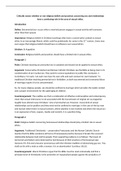have a continuing role in the area of sexual ethics.
Introduction
Define: Extramarital sex- occurs when a married person engages in sexual activity with someone
other than their spouse
Importance: Religious beliefs in Christian teachings often have a conservative outlook to sexual
ethics in an increasingly liberal, which could be problematic for some in the 21 st century. Some may
even argue that religious beliefs should have no influence over sexual ethics.
Scholars: St Augustine
Conclusion: Religious beliefs and practices should have a limited role in sexual ethics.
Paragraph 1
Point: Christian teaching on premarital sex is outdated and should not be applied to sexual ethics.
Argument: Conservative Protestant and Roman Catholic Christians see the Bible as being clear in its
condemnation of pre-marital sex. They point to several quotations to justify this conclusion. 1
Corinthians 7:2 reads, ‘Let each man have his own wife and each woman her own husband.” In
traditional Christian teaching premarital sex is forbidden, as both sacramental and covenantal ideas
of marriage require it to be consummated.
So, for many religious people, sex should be confined to marriage which provides the stable context
and a proper environment for the upbringing of children.
Counterargument: The realities are that a combination of effective contraception and contemporary
views that sexual intercourse is not associated with the transmission of original sin (as Augustine
taught) have altered many Christians’ view of premarital sex. However, many kinds of sexual
relationships can be positive and they need not be confined to marriage. In the case of the lay man
and woman where there is mutual consent, where adultery is not involved and where the sexual act
is an expression of love, respect, loyalty and warmth, it is a positive thing.
Paragraph 2
Point: Religious beliefs concerning homosexual relationships should play a limited role in sexual
ethics.
Argument: Traditional Christianity – conservative Protestants and the Roman Catholic Church–
teaches that the Bible condemns all forms of homosexual practice because it breaks the covenant
relationship between God and his people. Their supporting evidence is as follows: The towns of
Gomorrah and Sodom were destroyed by God because of their practices of homosexual rape
(Genesis 19). This story became synonymous with the Christian tradition of demonising gay sex. ‘You
shall not lie with a male as with a woman; it is an abomination’ (Leviticus 18:22).
Counterargument: Liberal Christians argue that the Bible must be read contextually and that a
principle tenet of Christianity is the protection of marginalised people against the prejudices of
, society. So, it is only right to value all human relationships as all people are made ‘imago dei’. With
these lines of argument in mind, they interpret Biblical teachings as follows:
Sodom and Gomorrah are condemned for all kinds of other wickedness. Jesus takes Sodom’s
notorious lack of hospitability as an example of the events which will be particularly judged on the
final day (Matthew 10). Leviticus condemns gay prostitution, not explicitly gay relationships.
Paragraph 3
Point: Religious beliefs on extramarital sex and divorce is extremely outdated as it is not loving to
dismiss the fact that marriages can break down.
Argument: Extramarital sex is adultery or sex with a prostitute. In Biblical times, the woman was
always held accountable as the ‘temptress’, however now women and men are - supposedly - in the
eyes of the Church, scorned equally. The Roman Catholic Church doesn’t recognise divorce as they
say that marriage is a sacrament. This means that people are married and their union is blessed by
God: this cannot be undone. They say that people should try counselling and work through their
problems. If the couple chooses to get a legal divorce, Roman Catholic Christians won’t recognise it
and believe that the person is still married to their first partner in the eyes of God. Therefore, if they
remarry, they are committing adultery.
Counterargument: Jesus’ teachings in John’s Gospel (8) emphasises the need for forgiveness and
understanding. This is particularly important where a person has divorced because of adultery and
wishes to remarry – the Church should therefore show love and generosity.






